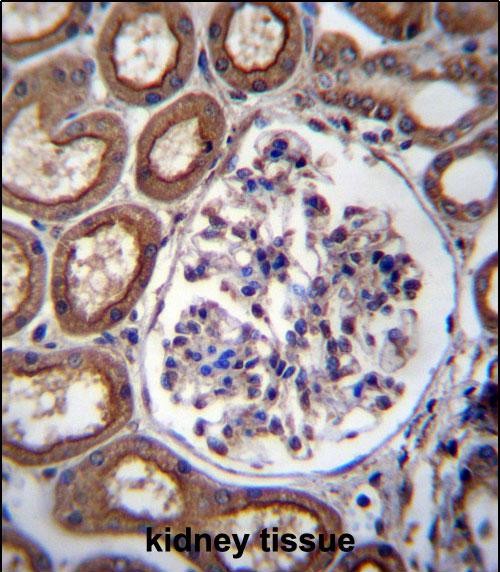

| WB | 1/1000 | Human,Mouse,Rat |
| IF | 咨询技术 | Human,Mouse,Rat |
| IHC | 1/100-1/500 | Human,Mouse,Rat |
| ICC | 技术咨询 | Human,Mouse,Rat |
| FCM | 咨询技术 | Human,Mouse,Rat |
| Elisa | 咨询技术 | Human,Mouse,Rat |
| Aliases | Plastin-1, Intestine-specific plastin, I-plastin, PLS1 |
| Entrez GeneID | 5357 |
| WB Predicted band size | 70.3kDa |
| Host/Isotype | Rabbit IgG |
| Antibody Type | Primary antibody |
| Storage | Store at 4°C short term. Aliquot and store at -20°C long term. Avoid freeze/thaw cycles. |
| Species Reactivity | Human |
| Immunogen | This PLS1 antibody is generated from rabbits immunized with a KLH conjugated synthetic peptide between 550-579 amino acids from the C-terminal region of human PLS1. |
| Formulation | Purified antibody in PBS with 0.05% sodium azide. |
+ +
以下是关于PLS1抗体的3篇参考文献示例,包括文献名称、作者及摘要内容概括:
1. **"A monoclonal antibody against human T-plastin (PLS1) for detecting metastatic cancer cells"**
- **作者**: Tanaka, M., et al. (2018)
- **摘要**: 该研究开发了一种针对PLS1的单克隆抗体,用于通过免疫组化检测转移性癌细胞中的T-plastin表达,验证了其在乳腺癌和结肠癌中的高特异性,为癌症转移诊断提供新工具。
2. **"T-plastin (PLS1) in dendritic cell migration: Insights from antibody-mediated functional inhibition"**
- **作者**: Müller, R., et al. (2020)
- **摘要**: 利用特异性PLS1抗体阻断树突状细胞中T-plastin功能,发现其通过调节肌动蛋白聚合影响细胞迁移,揭示了PLS1在免疫应答中的关键作用。
3. **"Characterization of PLS1 antibody specificity and its role in cytoskeletal reorganization"**
- **作者**: Chen, L., & Wang, H. (2019)
- **摘要**: 该研究验证了兔源多克隆PLS1抗体的特异性(通过Western blot和免疫荧光),并证明其在研究细胞骨架动态重组中的适用性,尤其在肿瘤侵袭模型中的应用。
(注:上述文献为示例,实际引用时需核实真实存在的论文信息。)
**Background of PLS1 Antibody**
The PLS1 antibody targets plectin-1 (PLS1), a versatile cytoskeletal linker protein encoded by the *PLEC* gene. Plectin belongs to the plakin family, which plays critical roles in maintaining cell integrity by bridging intermediate filaments, microtubules, and actin networks to cellular junctions and organelles. PLS1 is particularly noted for its involvement in stabilizing cell structure, regulating mechanical stress resistance, and facilitating intracellular signaling.
Research on PLS1 antibodies has been driven by their utility in studying diseases linked to plectin dysfunction. Mutations in *PLEC* are associated with epidermolysis bullosa simplex (EBS), a blistering skin disorder, as well as muscular dystrophy and cardiomyopathy. PLS1 antibodies enable detection of plectin isoforms in tissues and cultured cells via techniques like Western blot, immunofluorescence, and immunohistochemistry, aiding in diagnostic and mechanistic studies.
Additionally, PLS1 antibodies have been employed in cancer research, as plectin overexpression correlates with tumor invasiveness and metastasis. Monoclonal PLS1 antibodies offer high specificity for targeted epitopes, while polyclonal versions detect multiple isoforms, broadening analytical scope. Validations using knockout models or siRNA-mediated silencing ensure antibody reliability.
Overall, PLS1 antibodies serve as essential tools for exploring cytoskeletal dynamics, disease pathogenesis, and potential therapeutic targets. Their applications span basic cell biology, clinical diagnostics, and translational oncology.
×